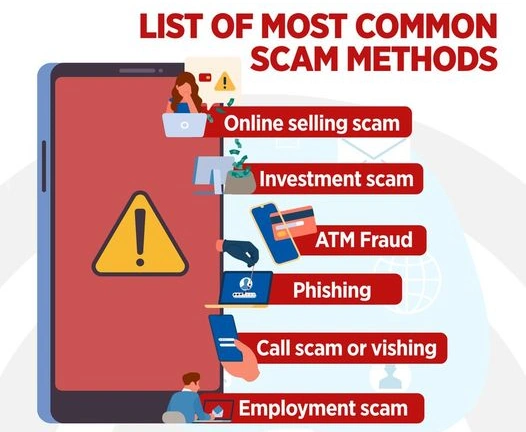The revelation by the Philippine National Police-Anti-Cybercrime Group (PNP-ACG) regarding the substantial financial losses due to scams and fraud in the country from January to August 2023 underscores the urgency and imperative for robust measures to combat cybercrimes and protect consumers. The proliferation of online scams and fraudulent activities not only erodes trust in financial institutions but also poses significant risks to the integrity and stability of the digital economy.
Key Insights and Implications:
- Emerging Threat Landscape: The prevalence of diverse scam methods such as online selling scams, investment scams, ATM fraud, phishing, call scams, and employment scams highlights the evolving tactics employed by fraudsters to exploit vulnerabilities and deceive unsuspecting victims. The sophisticated nature of these schemes necessitates continuous vigilance, awareness, and adaptive strategies to counteract and mitigate risks effectively.
- Challenges in Prosecution and Identification: The difficulties encountered by the PNP-ACG in identifying fraudsters due to fictitious identities and the limitations imposed by current regulations underscore the need for enhanced collaboration, technological capabilities, and legal frameworks to facilitate comprehensive investigations, trace illicit activities, and prosecute offenders. Addressing gaps in the regulatory landscape, strengthening enforcement mechanisms, and leveraging advanced technologies can bolster efforts to combat cybercrimes and enhance consumer protection.
- Regulatory and Compliance Considerations: The concerns raised regarding the opening of bank accounts online without stringent verification processes, adherence to the Know-Your-Customer (KYC) policy, and potential liabilities for financial institutions underscore the imperative for robust regulatory oversight, compliance adherence, and accountability mechanisms. Ensuring rigorous due diligence, implementing robust authentication protocols, and fostering a culture of compliance can mitigate risks, safeguard consumers, and foster trust in financial institutions.
- Legislative Initiatives and Consumer Protection: The advocacy for the enactment of the Anti-Financial Scamming Bill and the emphasis on addressing gaps in existing legislation reflect a proactive approach to enhancing the legal framework, strengthening consumer protection, and combating financial frauds effectively. By establishing a comprehensive and targeted legislative framework, policymakers can create a conducive environment for innovation, foster trust in digital transactions, and protect the interests of consumers and stakeholders.
- Collaborative Efforts and Stakeholder Engagement: The collaborative efforts between law enforcement agencies, regulatory bodies, financial institutions, and policymakers are pivotal in devising holistic strategies, sharing insights, fostering innovation, and implementing coordinated initiatives to address the multifaceted challenges posed by cybercrimes. Engaging stakeholders, promoting information sharing, and fostering synergies can amplify efforts, enhance resilience against threats, and safeguard the digital ecosystem.
- Economic Implications and Trust: The emphasis on preserving trust in financial institutions, fostering a resilient digital economy, and leveraging the potential of the Philippines as an economic powerhouse underscores the interconnectedness of cybersecurity, economic prosperity, and societal well-being. By prioritizing cybersecurity, investing in robust infrastructure, and promoting a culture of cybersecurity awareness, stakeholders can foster confidence, stimulate innovation, and unlock sustainable growth opportunities.
In conclusion, the revelations regarding the significant financial losses due to scams and fraud in the Philippines highlight the imperative for proactive measures, collaborative initiatives, and robust regulatory frameworks to combat cybercrimes, safeguard consumers, and foster a secure and resilient digital ecosystem. By embracing innovation, promoting collaboration, and prioritizing cybersecurity, stakeholders can navigate the evolving threat landscape, mitigate risks, and unlock the full potential of the digital economy, ensuring a prosperous and secure future for all.



